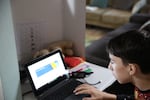
In Oct. 2020, Class Of 2025 student Raiden logs into his school chromebook. It's the device he's using for his eighth grade year to do distance learning during the coronavirus pandemic.
Rob Manning / OPB
As Oregon Gov. Kate Brown has adjusted business rules for COVID-19 in recent weeks, metrics for schools to restart in-person instruction have stayed the same. Many districts in the Portland area aren’t planning to open doors to most students until at least February. However, many parents — and some local officials — are pushing for schools to open sooner. They’re arguing that health risks for children are less than they are for older people, and distance learning brings its own downsides in terms of mental health difficulties and what experts are calling “unfinished learning” for children.
The problems are showing up among students in the “Class Of 2025″ — a group of 27 students OPB has been following since they were in kindergarten eight years ago.
Class Of 2025 student, Raiden, wasn’t having an easy time in school even before the coronavirus pandemic. He’s attended a half-dozen schools in three different school districts, in two different states. He was able to adjust in part thanks to how easily he makes friends. But this might be Raiden’s toughest year yet, as like thousands of other Oregon eighth-graders, he tries to get through eighth grade online. And like many students, he’s frustrated with it.
“There was this one time that I was on Zoom and we’re doing an assignment,” Raiden recalled recently. And my teacher went ahead when I didn’t have answers, right? So I asked her to go back.”
But the teacher didn’t slow down. Getting a teacher to slow down can be even harder over Zoom than in a middle school classroom. His teacher encouraged him to hand in what he had, so Raiden submitted work he knew included wrong answers.
“So I mean it feels like they’re helping, but then it doesn’t seem like it,” Raiden said of his teachers
Raiden has always appreciated the social aspects of school, like working with other students and getting to know his teachers. He’s funny and likable.
For years, Raiden’s diagnosis of Attention Deficit Hyperactivity Disorder — ADHD — has helped him get extra support at school. But learning from home there’s no teacher or aide, and both his parents work out of the house most weekdays. Without the help, his grades are suffering.
“We just did parent-teacher conferences, and he’s failing every class,” Raiden’s mother Angela said in an interview earlier this fall.
Angela described how challenging the new platforms can be to interact with: the conferences included lots of parents over a big group Zoom, and she was directed to the online applications for answers.
“You have Zoom, you have TeacherVUE, you have ParentVUE...” Angela said, listing off a handful of other application names before making her broader point — that she’s frustrated because her sons are putting work in.
“I see them on the computer like 24-7. But then the grades are still bad. So I’m confused. And [Raiden]’s mad at me because he thinks I think he’s not doing anything.”
“And I say ‘well the grades say you’re not.’ And I don’t know who to believe — the grade or my son.”
Confusion and frustration have some parents pushing to expand in-person instruction as quickly as possible, even as COVID-19 case numbers are skyrocketing.
Leslie Bienen, a health science professor at the School of Public Health run by Portland State University and Oregon Health and Science University, is among the volunteer organizers of a petition to reopen schools. It’s gathered thousands of signatures with two main goals.
“One is more local control by districts and local lawmakers,” Bienen told OPB. “The second is that families be given a choice to participate in some kind of in-person option, something after the Christmas break.”
The governor loosened rules back in October, to allow more in-person instruction. At first, that allowed thousands more students into classrooms in mostly rural parts of the state, hitting a high of more than 63,000 students spending some time in a physical classroom. But by late November, that went down to fewer than 49,000 students as coronavirus numbers rose. That means fewer than one in ten Oregon school children is spending any significant time learning in person.
Teachers have been reluctant to return to the classroom, citing the risk of catching COVID-19. Portland Public Schools officials recently took teachers on a tour of a district elementary school to demonstrate steps they’re taking to ensure a safe, eventual return to in-person instruction. PPS teacher Emily Markewitz at a union bargaining meeting she said she sees how hard her district is trying to make schools safe for students to return. But she and other teachers remain very uneasy.
“What also really struck me is that no matter how much careful planning and thought that is done, there are just some aspects of in-person education that can not be made safe — or feasible,” Markewitz said.
A survey by the Kaiser Family Foundation found that a quarter of teachers are at increased risk of serious illness from coronavirus. The Oregon Health Authority has reported a number of COVID-19 cases at schools with in-person instruction, but not in numbers that suggest it’s spreading at school.
School leaders are torn. Maureen Wolf is chair of the school board in the Tigard-Tualatin School District and is the incoming president of the Oregon School Boards Association. She was hopeful when the rules changed in October, that it would lead to some districts resuming in-person instruction.
“I thought that was really going to get us in motion, to at least get to hybrid learning, and was very excited for those opportunities for our younger students,” Wolf said. “I guess I would like to revisit again.”
Wolf is not pressing for immediate changes but said she would like to be part of a new look at the metrics in early 2021. The school boards association also wants legislators to pass liability protections for school districts, against possible COVID-19 lawsuits.

Class Of 2025 student Raiden, sits on the couch with his mother Angela, in their home in Gresham, in Oct. 2020. Like thousands of eighth graders like him, Raiden has been learning from home since the coronavirus pandemic shuttered school buildings in March.
Rob Manning
In the meantime, parents like Raiden’s mom Angela blame distance learning for falling grades.
“I think most of it is due to the COVID situation because he’s hyperactive, and I’m still working full time,” Angela said.
Raiden, for his part, says his grades used to be helped by his participation. Now it’s all about assignments. To get them in, and get the answers right, he finds workarounds.
“I’m doing algebra in my math class. So I put, like, the problem in the calculator, and it would give me an answer,” Raiden explained. “And I mean, that’s pretty much how I get my grade up, because I pretty much can’t really do it myself without help from someone.”
Perhaps most troubling for Angela, is that Raiden and his younger brother just don’t seem motivated. They don’t feel like brushing their teeth or hair, or getting out of their pajamas.
“They’re kind of like, ‘What’s the point? They’re not seeing my whole outfit’,” Angela said, recalling their conversation.
“And I said, ‘You need to do it for your own self because you’re going to get sad and just go into, like, a bad mood and just going to stay there. So you gotta do that stuff. And I’m not here, because unfortunately, I have to pay the mortgage,” Angela said with a laugh.
State officials said recently they’re not planning to revisit guidelines immediately, though Gov. Brown has repeatedly stressed that reopening classrooms to students is a high priority. And the pressure is mounting, including from some school districts and local officials in addition to many parents, who see the benefits of in-person instruction potentially outweighing the risks of the virus.
For more of the latest about OPB’s Class Of 2025 students, listen to the second season of the Class Of 2025 podcast, with new episodes posting through December.
